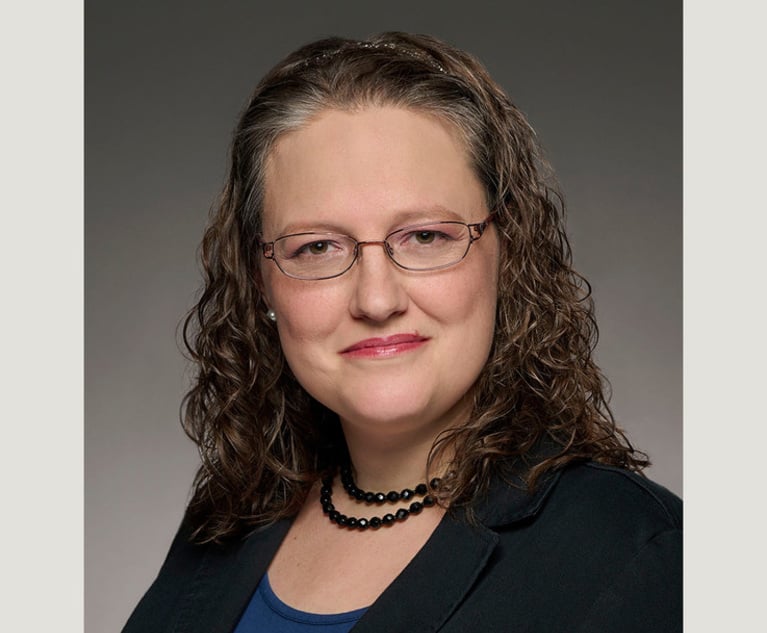Del. Gov. Names 2 Women for New Chancery Seats as Business Court Expands
Delaware Gov. John Carney has nominated Morgan T. Zurn, currently a master in Chancery, and Kathaleen S. McCormick, a corporate litigator with Young, Conaway, Stargatt & Taylor, to serve as vice chancellors on the Delaware Court of Chancery.
September 21, 2018 at 04:39 PM
4 minute read
The original version of this story was published on Delaware Law Weekly

Delaware Gov. John Carney has nominated Morgan T. Zurn, currently a master in Chancery, and Kathaleen S. McCormick, a corporate litigator with Young, Conaway, Stargatt & Taylor, to serve as vice chancellors on the Delaware Court of Chancery.
The selections, announced Thursday afternoon, would fill two newly created openings on the nation's pre-eminent business court and add two more women to a bench that has historically been dominated by men. If confirmed, Zurn and McCormick would join Vice Chancellor Tamika Montgomery-Reeves to form a court with an unprecedented three women. Four men would be serving alongside them on the expanded court, venue for corporate litigation for most of the Fortune 500.
Both Zurn and McCormick will need to be confirmed by the state Senate during a special session of the legislature on Oct. 3.
Zurn, a graduate of the University of Pennsylvania Law School, is a former state prosecutor, who joined the Chancery Court as a master in 2016, mostly handling disputes involving guardianships, trust and estates. If confirmed, she would be the second judge on the current court to be promoted from master to vice chancellor.
McCormick, a partner in Young Conaway's corporate litigation and counseling group, has focused her practice on advising clients in corporate, commercial and alternative entity law. A graduate of the University of Notre Dame Law School, she has also handled public interest matters statewide through the Community Legal Aid Society Inc.
“Katie McCormick is an experienced Chancery lawyer, with knowledge both deep and broad that will make her an immediate asset to the court,” Carney said in a statement. “Katie impressed me with her sharp mind, strong work ethic and commitment to public service. She will be an outstanding jurist and representative for the court and state.”
Of Zurn, Carney said: “She has earned an outstanding reputation as an advocate and judicial officer, exhibiting intelligence, diligence, efficiency and integrity. Master Zurn has met the high standards of our Court of Chancery and I am pleased that she will be able to expand her contribution to the court and state.”
The nominations, Carney's first for the Chancery Court, come at a time of significant change for the composition and structure of the 226-year old Delaware institution.
Carney's predecessor, Gov. Jack Markell, oversaw a historic reshuffling of the state judiciary from 2009 to 2016. During his tenure, Markell appointed all five of the Chancery Court's judges, including Montgomery-Reeves, who became only the second woman and first African-American to ever serve on the court.
In June, lawmakers approved Carney's request to expand the court to seven judges, amid a push by Delaware Supreme Court Chief Justice Leo E. Strine Jr. to bolster Delaware's legal service industry—considered to be one of the top economic drivers in the state.
If confirmed, Carney's selections would bring a new gender balance to the bench, with three of the court's seven seats held by women.
Zurn and McCormick are expected to work out of the Leonard L. Williams Justice Center in Wilmington, a sign that the Chancery Court may be moving away from the principle of geographical balance that has guided nominations in the past.
Though not required by Delaware law, governors have been careful to ensure that each of the state's three counties is represented on the Chancery Court. Vice Chancellors Joseph R. Slights III and Sam Glasscock III represent Kent and Sussex counties, respectively; however, most of the court's work is conducted in Wilmington, the state's biggest city, where five judges are now expected to reside.
Legal observers in recent years have questioned the rationale for maintaining party balance, and corporate law professor Lawrence Hamermesh said it may be time to retire the tradition altogether.
“If that's a ship that's sailing off into the sunset, I don't have any complaints about the ride, but I'm not sorry to see it go,” said Hamermesh, who teaches at Widener University Delaware Law School.
The nominations also come as another tenet of judicial appointments—the state's party balance mandate—has come under legal attack.
Unlike the geographical requirement, Delaware's constitution mandates that no more than a “bare majority” of the court be held by members of one of the two major political parties. A federal judge last year struck the provision as unconstitutional, but has allowed Carney to continue nominating judges in the meantime.
Carney has appealed the ruling to the U.S. Court of Appeals for the Third Circuit, which is expected to hear arguments on Tuesday.
McCormick was part of a team of attorneys from Young Conaway representing Carney in that case.
This content has been archived. It is available through our partners, LexisNexis® and Bloomberg Law.
To view this content, please continue to their sites.
Not a Lexis Subscriber?
Subscribe Now
Not a Bloomberg Law Subscriber?
Subscribe Now
NOT FOR REPRINT
© 2025 ALM Global, LLC, All Rights Reserved. Request academic re-use from www.copyright.com. All other uses, submit a request to [email protected]. For more information visit Asset & Logo Licensing.
You Might Like
View All
3rd Circ Orders SEC to Explain ‘How and When the Federal Securities Laws Apply to Digital Assets’
5 minute read
Womble Bond Dickinson's Wilmington Office Sees New Leadership as Merger Is Completed
4 minute read

Trending Stories
- 1Reviewing Judge Merchan's Unconditional Discharge
- 2With New Civil Jury Selection Rule, Litigants Should Carefully Weigh Waiver Risks
- 3Young Lawyers Become Old(er) Lawyers
- 4Caught In the In Between: A Legal Roadmap for the Sandwich Generation
- 5Top 10 Developments, Lessons, and Reminders of 2024
Who Got The Work
J. Brugh Lower of Gibbons has entered an appearance for industrial equipment supplier Devco Corporation in a pending trademark infringement lawsuit. The suit, accusing the defendant of selling knock-off Graco products, was filed Dec. 18 in New Jersey District Court by Rivkin Radler on behalf of Graco Inc. and Graco Minnesota. The case, assigned to U.S. District Judge Zahid N. Quraishi, is 3:24-cv-11294, Graco Inc. et al v. Devco Corporation.
Who Got The Work
Rebecca Maller-Stein and Kent A. Yalowitz of Arnold & Porter Kaye Scholer have entered their appearances for Hanaco Venture Capital and its executives, Lior Prosor and David Frankel, in a pending securities lawsuit. The action, filed on Dec. 24 in New York Southern District Court by Zell, Aron & Co. on behalf of Goldeneye Advisors, accuses the defendants of negligently and fraudulently managing the plaintiff's $1 million investment. The case, assigned to U.S. District Judge Vernon S. Broderick, is 1:24-cv-09918, Goldeneye Advisors, LLC v. Hanaco Venture Capital, Ltd. et al.
Who Got The Work
Attorneys from A&O Shearman has stepped in as defense counsel for Toronto-Dominion Bank and other defendants in a pending securities class action. The suit, filed Dec. 11 in New York Southern District Court by Bleichmar Fonti & Auld, accuses the defendants of concealing the bank's 'pervasive' deficiencies in regards to its compliance with the Bank Secrecy Act and the quality of its anti-money laundering controls. The case, assigned to U.S. District Judge Arun Subramanian, is 1:24-cv-09445, Gonzalez v. The Toronto-Dominion Bank et al.
Who Got The Work
Crown Castle International, a Pennsylvania company providing shared communications infrastructure, has turned to Luke D. Wolf of Gordon Rees Scully Mansukhani to fend off a pending breach-of-contract lawsuit. The court action, filed Nov. 25 in Michigan Eastern District Court by Hooper Hathaway PC on behalf of The Town Residences LLC, accuses Crown Castle of failing to transfer approximately $30,000 in utility payments from T-Mobile in breach of a roof-top lease and assignment agreement. The case, assigned to U.S. District Judge Susan K. Declercq, is 2:24-cv-13131, The Town Residences LLC v. T-Mobile US, Inc. et al.
Who Got The Work
Wilfred P. Coronato and Daniel M. Schwartz of McCarter & English have stepped in as defense counsel to Electrolux Home Products Inc. in a pending product liability lawsuit. The court action, filed Nov. 26 in New York Eastern District Court by Poulos Lopiccolo PC and Nagel Rice LLP on behalf of David Stern, alleges that the defendant's refrigerators’ drawers and shelving repeatedly break and fall apart within months after purchase. The case, assigned to U.S. District Judge Joan M. Azrack, is 2:24-cv-08204, Stern v. Electrolux Home Products, Inc.
Featured Firms
Law Offices of Gary Martin Hays & Associates, P.C.
(470) 294-1674
Law Offices of Mark E. Salomone
(857) 444-6468
Smith & Hassler
(713) 739-1250






